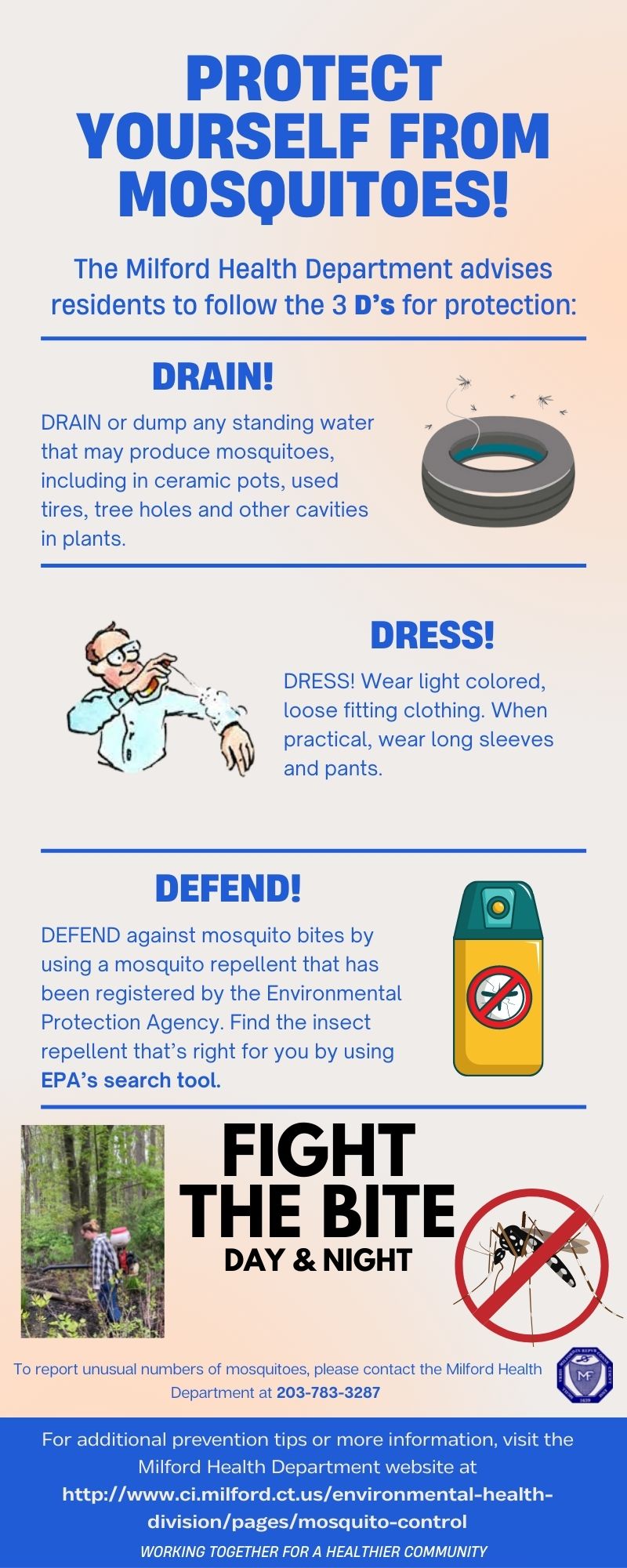Mosquito Control
In order to protect yourself and your family from West Nile Virus and other viruses carried by mosquitoes follow these steps:
Actively reduce mosquitoes around your home:
- Check your yard weekly for water filled containers.
- Dispose of water-holding containers, such as ceramic pots, used tires, etc. outside the house.
- Keep garbage and recycling containers covered
- Drill holes in the bottom of containers such as those used for recycling to keep them drained.
- Clean clogged roof gutters.
- Turn over objects that may trap water when not in use such as wading pools and wheelbarrows.
- Change water in birdbaths on a weekly basis.
- Clean and chlorinate swimming pools, and cover the pool when not in use.
- Use landscaping to eliminate areas where water can collect on your property.
- Fill tree holes and other cavities in plants with sand or soil.
Avoid mosquito bites:
- Minimize time spent outdoors at dusk and dawn.
- Be sure door and window screens are tight fitting and in good repair.
- Wear shoes, socks, long pants, and long-sleeved shirts.
- Use mosquito netting when sleeping outdoors.
- Cover infant carriers with mosquito netting.
- Consider using mosquito repellent when it is necessary to be outdoors and always use them according to label instructions. The most effective repellents contain DEET or Picaridin. Oil of lemon eucalyptus is also effective for brief periods of exposure.
For information on using insect repellent safely, click here.
- When using DEET, use the lowest concentration effective for the time spent outdoors (for example, 6% lasts approximately 2 hours and 20% for 4 hours) and wash treated skin when returning indoors.
- Do not apply under clothing, to wounds or irritated skin, the hands of children, or to infants less than 2 months.
- Permethrin-containing repellents (e.g., Permanone) are recommended for use on clothing, shoes, bed nets, and camping gear. Remember: don't use permethrin on skin.

For information about All Habitat Services, visit the website at http://allhabitat.com/mosquito-tick-control/mosquito-control-municipal-program/
Connecticut Mosquito Management Program: http://www.ct.gov/mosquito/site/default.asp
- Mosquito Ecology - http://www.ct.gov/mosquito/cwp/view.asp?a=3486&q=415040&mosquitoNav=|
- CT Mosquito Transmitted Diseases - http://www.ct.gov/mosquito/cwp/view.asp?a=3486&q=415006&mosquitoNav=|
For More Information from the Centers for Disease Control and Prevention follow these links:
West Nile Virus (WNV) - http://www.cdc.gov/westnile/
Eastern Equine Encephalitis - http://www.cdc.gov/EasternEquineEncephalitis/
Dengue Virus - http://www.cdc.gov/Dengue/
Chikungunya Virus - http://www.cdc.gov/chikungunya
Zika Virus - http://www.cdc.gov/zika/index.html
Malaria - https://www.cdc.gov/parasites/malaria/index.html
Vaccine Information for Travelers - CLICK HERE

